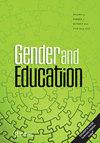Examining the gendered timescapes of higher education: reflections through letter writing as feminist praxis
IF 1.9
3区 教育学
Q2 EDUCATION & EDUCATIONAL RESEARCH
引用次数: 1
Abstract
ABSTRACT This article examines the significance of neoliberalism in re/shaping the gendered timescapes of higher education in Ghana through its intersection with patriarchal forces. It draws from a project aiming to create non-hierarchical, co-mentoring spaces in which participants collaboratively generate feminist analyses. Letter-writing was identified as a form of feminist praxis and an auto/biographical method to access the multidimensional inequalities women navigated in their careers. Opening counter-hegemonic time–space and providing feminist conceptual resources, the women explored their aspirations, experiences, and subjectivities. In Ghana, women are attempting to balance the accelerated temporalities of neoliberal higher education, as productive subjects, with the explicit demands of patriarchy, which construct them primarily in reproductive terms as wives and mothers. Our collective reflections illustrate that intersecting forces are at play that impact women’s higher education careers in unpredictable and contradictory ways.审视高等教育的性别时代:通过书信写作作为女权主义实践的思考
摘要本文通过与父权制力量的交叉,探讨了新自由主义在重塑加纳高等教育性别时代格局中的意义。它借鉴了一个旨在创建非层级、共同指导空间的项目,参与者在其中合作生成女权主义分析。写信被认为是女权主义实践的一种形式,也是一种了解女性在职业生涯中所经历的多维不平等的自动/传记方法。打开反霸权的时空,提供女性主义的概念资源,女性探索自己的愿望、经历和主体性。在加纳,妇女正试图平衡新自由主义高等教育作为生产性科目的加速时间性与父权制的明确要求,父权制主要从生育角度将她们塑造成妻子和母亲。我们的集体反思表明,相互交叉的力量正在以不可预测和矛盾的方式影响女性的高等教育生涯。
本文章由计算机程序翻译,如有差异,请以英文原文为准。
求助全文
约1分钟内获得全文
求助全文
来源期刊

Gender and Education
EDUCATION & EDUCATIONAL RESEARCH-
CiteScore
5.20
自引率
9.10%
发文量
31
期刊介绍:
Gender and Education grew out of feminist politics and a social justice agenda and is committed to developing multi-disciplinary and critical discussions of gender and education. The journal is particularly interested in the place of gender in relation to other key differences and seeks to further feminist knowledge, philosophies, theory, action and debate. The Editors are actively committed to making the journal an interactive platform that includes global perspectives on education, gender and culture. Submissions to the journal should examine and theorize the interrelated experiences of gendered subjects including women, girls, men, boys, and gender-diverse individuals. Papers should consider how gender shapes and is shaped by other social, cultural, discursive, affective and material dimensions of difference. Gender and Education expects articles to engage in feminist debate, to draw upon a range of theoretical frameworks and to go beyond simple descriptions. Education is interpreted in a broad sense to cover both formal and informal aspects, including pre-school, primary, and secondary education; families and youth cultures inside and outside schools; adult, community, further and higher education; vocational education and training; media education; and parental education.
 求助内容:
求助内容: 应助结果提醒方式:
应助结果提醒方式:


